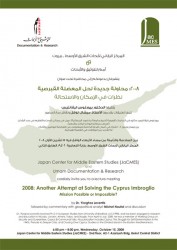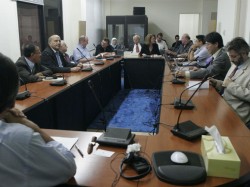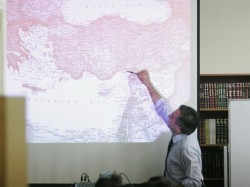“Muslims and Islamic Studies in Japan ”
| Date / Time | Wednesday, October 15, 2008. 18:00-20:00 |
|---|---|
| Venue | Japan Center for Middle Eastern Studies(JaCMES), 2nd Floor, A2-1, Azariyeh Bldg, Beirut Central District |
| Language | English |
| For further Information | 01-975851 (JaCMES) 01-553604 (Umam Documentation & Research) |
| The meeting is open to the public |
The lecture outlined the historical background to the Cyprus question as an issue of implementation of the principle of self-determination enshrined in the Atlantic Charter (1941) as well as in the UN Charter (1945). The Cypriot demand for self-determination was in the 1940s equivalent to enosis, the union of the island with Greece ? especially as this was implicitly promised to the Cypriots by Winston Churchill. As the Nazi Germans occupied Greece in 1941, the wartime British PM urged on the islanders to voluntarily join the British forces in order to “fight for freedom, fight for Greece”. The Greek Cypriots responded joining the war efforts in their thousands; only to be betrayed as the defeat of Nazism did not bring the promised enosis but a continuation of the colonial rule. Moreover in 1954, the British started building up two powerful military bases on the southern coast of the island, which were reinforced after the Suez debacle a couple of years later.
Their withdrawal from the UN mandate for Palestine (1948) coupled with the evacuation of their forces from Suez forced the British to transfer their Middle East Military Headquarters to Cyprus. The strategic importance of the island as a staging post for operations in the region grew exponentially. The building of the RAF Akrotiri airbase turned the island into an unsinkable aircraft carrier, firmly anchored in the Eastern Mediterranean. Greece, ravaged by ten years of war (1940-49), was too weak to be entrusted such an important base. Hence the 1960 Treaties between the UK, Turkey and Greece produced a Republic of Cyprus which bore more affinity to a protectorate than to a sovereign state.
The lecturer drew attention to the large presence (40,000-43,000) of Turkish troops with the state of the art weaponry occupying the northern third of the island since 1974. He explained that despite the positive climate created by the current Greek and Turkish Cypriot leaders the two sides remain apart as regards the perception of the nature of the searched for new settlement. Whereas the Greek Cypriot side perceives it as a transformation of the RoC from a unitary to a federal state without guarantor powers, the Turkish Cypriot side insists that the basis of the talks is that two states, the RoC and the self-styled TRNC are negotiating to form a new state. Moreover the TC side is unwilling to accept European as opposed to Turkish guarantees and military presence.
Last but not least, Dr Leventis placed emphasis on the role of the island regarding crisis management, humanitarian aid and peace-keeping operations to Lebanon. Since 1 May 2004, the island republic has been the EU’s outpost in the Middle East. The RoC is the southeastern-most EU member state ? lying only 240 kms away from Beirut. Tellingly, in the crisis of summer 2006, tens of thousands of Lebanese citizens were evacuated via Cyprus. The Lefkosia government has placed the airport of Larnaca, the naval port of Lemesos, as well as the Andreas Papandreou airbase in Pafos at the disposal of the ongoing UNIFIL operation. In this connection, Turkey’s high-profile role in providing substantial manpower and military hardware for UNIFIL was also noted. Turkey sought unsuccessfully to assume the naval command of the UNIFIL operation in the sea between Cyprus and Lebanon. Turkey’s bid for UNIFIL’s command raised eyebrows in the RoC in view of the continuing Turkish occupation of the northern part of its territory.
Thus a settlement of the Cyprus question which would include a phased withdrawal of the huge Turkish occupation force would enhance stability in the region.
Furthermore, in his concluding remarks, Prof. Leventis pointed out the glaring need for a comprehensive security system that will serve the best interests of all the peoples in the Eastern Mediterranean basin.



